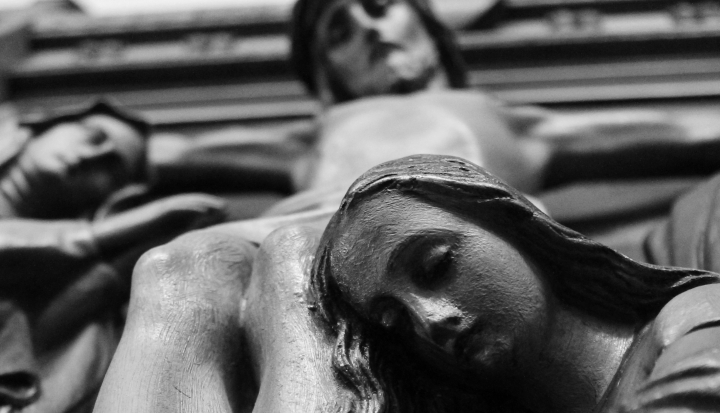“Lead us not into temptation.” Christians have prayed these words so many times, it’s easy to slide over their meaning, but they are a bit curious, aren’t they?
Would God really lead people into temptation? Isn’t that supposed to be the job of the other guy, the one with the horns and pitchfork?
You can find the short answer in the New Testament Letter of James: “No one experiencing temptation should say, ‘I am being tempted by God’; for God is not subject to temptation to evil, and he himself tempts no one” (1:13). Don’t try to shift responsibility, James is saying; God does not tempt, and God cannot lead people into evil. But that answer only produces another question: So why ask for something that’s not only contrary to what Christians believe about God but also impossible?
Of course believers make this odd petition so often because it is part of that most famous of prayers, the Lord’s Prayer. Different versions of the prayer appear in Matthew 6 as part of the Sermon on the Mount and in Luke 11 as Jesus’ example of how the disciples are to pray. This context—along with the fact that by the prayer’s opening address “Our Father [abba],” Jesus invited the disciples into his own special relationship with God—makes the prayer and its words important.
“Lead us not into temptation” comes in the second set of the prayer’s petitions. The first set asks for the complete coming of the reign of God on earth, when the divine name will be known by the whole world and all will follow the divine will just as it is already obeyed in heaven. The second addresses the needs of the community of disciples: asking for a day’s sustenance, realizing one’s own forgiveness lies in forgiving others, and—here it is—asking for help in facing “temptation.” But that’s the word the liturgy uses; the Bible passage says “do not subject us to the final test,” or, in another translation, “do not bring us to the time of trial.”
The final test, the time of trial: This petition is asking for strength to face God’s judgment of the world at the end of time. Like the whole prayer, though, it has a present-time dimension as well. Just as to ask for the coming of God’s kingdom is to hasten its arrival now, to pray for courage at the end of the world is to ask for it in this moment.
Admittedly “lead us not into temptation” is a strange way to put it, but the phrase acknowledges that tests and trials of faith call for strength—and that is what God provides. And it gets better: God offers deliverance and rescue from evil as well, as the closing words of the Lord’s Prayer say.
So there is hope. “God is faithful and will not let you be tried beyond your strength,” St. Paul wrote in his First Letter to the Corinthians, “but with the trial he will also provide a way out, so that you may be able to bear it” (10:13).
This article appeared in the February 2012 issue of U.S. Catholic (Vol. 77, No. 2, page 62).
Have a question you’d like to get answered? Ask us at editors@uscatholic.org!













Add comment